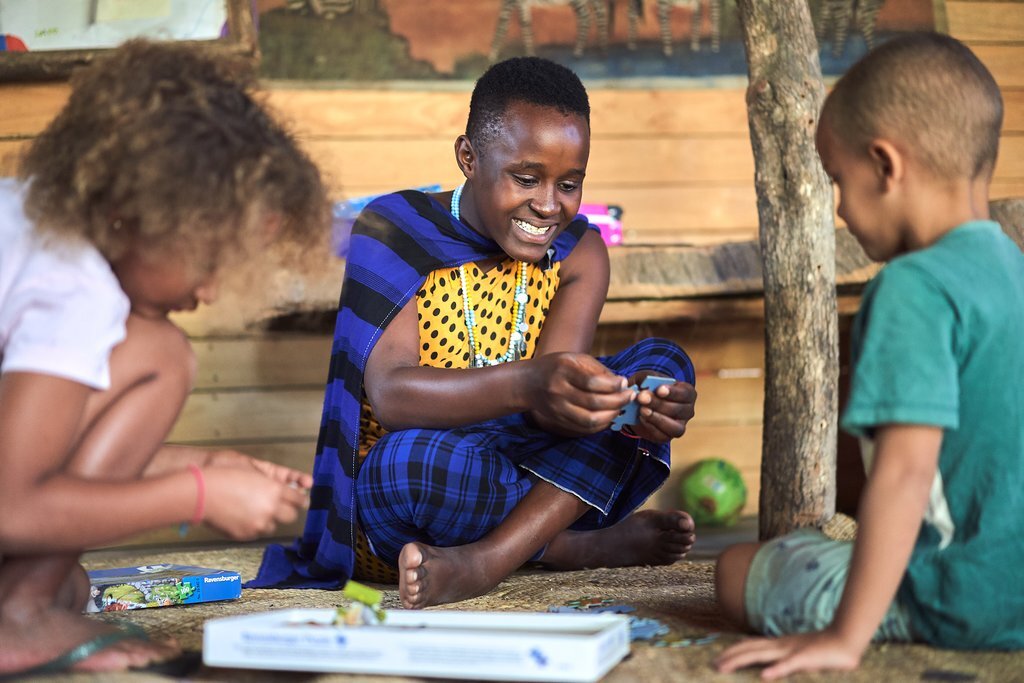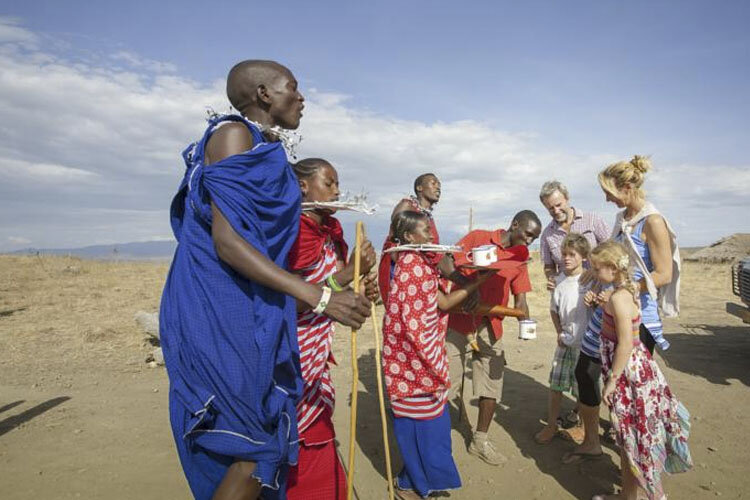Debunking 10 Myths About Traveling to Africa
Debunking 10 Myths About Traveling to Africa
Once you visit Africa, it never really leaves your consciousness. This vast continent offers an incredible richness of experiences for adventurous travelers eager to visit different landscapes, observe the largest and most majestic animals on the planet, and meet various different tribes, each unique in their own way. And Africa’s skies at night are incomparable, with the clearest views of the twinkling mosaic of stars, colorful nebulae, and vast galaxies above. Few people forget their first sunset in Africa — when the deep orange sun sets over the baked grasslands of the Serengeti.
No words, no photographs, and no video footage can possibly do justice to the beauty and majesty of this singular continent, but that doesn’t mean we aren’t going to try! Here at Sababu Safaris, we create custom Tanzania safaris to make people’s dream African trip a reality. And in the name of reality, we wanted to debunk many of the myths and misconceptions about this incredible place. If anything we write inspires you to start planning a trip to Tanzania, please feel free to reach out and ask for a sample itinerary and quote.
10) Africa is A Country
Let’s get the most pervasive, yet silliest, myth out of the way first. Many people seem to be of the opinion that Africa is a single country as opposed to a continent full of a diverse range of countries and cultures. In fact, there are 54 countries in Africa.
A softer, more insidious version of this myth is the vaguely held assumption that African countries are all roughly the same in terms of language and culture, thus holding that Africa might as well be a country. This couldn’t be further from the truth, as there are between 1,500 and 2,000 languages in Africa all spread out over its 54 distinct countries. Africa most certainly is not a country; it is the second biggest continent in the world!
9) You Can Only See the Great Migration Between July and October
This myth refers to perhaps the most famous natural event in Tanzania, if not in all of Africa: The Great Migration of over two million animals (approximately 1.5 million wildebeest, 200,000 zebras, and 350,000 different species of antelope) in Tanzania’s Serengeti National Park.
Given the impressive spectacle created by the world’s largest land migration, it is perhaps the most popular event on people’s safari calendar. The biggest and most pervasive myth about The Great Migration is that it only occurs between July and October. This is simply not true, as the migration occurs all year round — it’s just what you can expect to see that changes with the time of year.
If you’d like to see the famous river crossing, then you should visit the Northern Serengeti between August and October. If you’d like to see newly-born wildebeest calves, zebra, and antelope, visit the Southern Serengeti between January and March to witness the calving season. If you’d like to learn more, check out our 10 facts about the Great Migration.
8) Africa’s Animals Want to Eat You
It is a dreamed-up fear by anxious travellers that African animals are constantly out to eat you. Given the films, books, and documentaries focusing on the deadliness of Africa’s wildlife, it’s not surprising that people believe that the continent’s wildlife want to eat humans. However, in most cases it is simply not true, and one of the most striking things most people notice when they first set out on a safari is that the animals are mostly indifferent to people. People simply aren’t part of the natural ecosystem and we are not the prey Africa’s impressive predators are looking for. As long as you keep a safe distance and you are in the company of trained local safari experts, then you have nothing to fear.
However, it is important to note that many of the animals can be dangerous if you don’t know what you’re doing. That is why Sababu Safaris only hires guides with extensive experience. We invest in the skills and expertise of local guides, thus supporting the people of Tanzania.
7) Africa is Full of Disease
This is another common myth, and it perhaps has the potential to scare more people in the wake of the global COVID-19 pandemic. As we’ve said above, Africa is a truly vast continent, with a huge variance when it comes to healthcare and health resources. It is this disparity of wealth and resources that has resulted in the occasional epidemic in parts of Africa. But specific parts of Africa struggling with the likes of HIV or Ebola do not mean that visitors are in danger of contracting a disease.
In fact, the African continent has had one of the lowest infection rates of Covid-19. When traveling to Africa, specifically on a safari, you are immersed in nature, away from any crowds…one of the safest trips you can take! :)
6) Africa is Dangerous
This myth is sort of a combination of the previous two myths with a few other factors thrown in. There is a general sense by some people around the world that Africa is unsafe. Animals and disease only make up a part of this perception of danger; the rest comes from a profound misunderstanding about its people and cultures. Mostly, this misunderstanding can be attributed to slanted news stories of conflict and war the rest of the world is interested in.
There are some places in Africa that can be dangerous for tourists, but it’s the second largest continent in the world, with dozens of countries, so this is hardly exceptional. After all, there are parts of Asia, Europe, North and South America, and Australia that are best avoided too. There are many countries in Africa that are perfectly safe for tourism, and Tanzania is one of these many safe African countries.
5) Africa is not Suitable for Solo Travelers
We know we’ve talked a lot about safety and danger on this blog, so this is the last myth about danger in relation to traveling in Africa. Myths about the safety of women solo travellers bears mentioning here — especially given that women have proven to be more voracious and ambitious travellers than men in recent years. Of course, it’s always worth noting that there are always risks associated with leaving your home and exploring the world. But we would like to argue that Africa is not inherently more dangerous for solo female travellers than it is for male travelers.
There is little to no evidence that Africa is less safe for women to travel around Africa’s top tourist destinations than it is for men. Just as Tanzania, Namibia, Ghana, Kenya, and Malawi (to name but a few) are safe for male travellers, they are also safe for female travellers. It’s also worth noting that all of our safaris are privately guided - which means that you will have your own private driver guide with you from the moment you step off the plane. You will never have to look for a transfer or find your way through a strange town by yourself. On top of that, you will have the support of your accommodation staff, and anyone else responsible for ensuring you have a great trip.
4) Africa is not a Travel Destination for Children
There are some pervasive myths related to Africa’s suitability as a travel destination for families with young children. Firstly, we’d say that it’s impossible to generalize about Africa in this way as there is an almost endless range of destinations to visit on the continent.
We’ve found that children often make the most engaged and captivated safari guests. They tend to be even more impressed by the animals and the landscapes than their parents are, and a safari is perhaps the best way to teach your children to love and respect nature. For more information, check out our Tanzania family safaris.
3) All of Africa is Poor
This myth comes from an understandable place, as many countries in Africa do struggle with poverty and wealth inequality. The myth that poverty prevails throughout the entire continent of Africa is also propagated by well-meaning aid campaigns such as Save the Children and Water Aid who work to relieve specific parts of Africa. These charities do great work bringing awareness to people all over the world who want to help. But not all of Africa is poor, and not all of Africa is in need of charity. For many countries in Africa, the best thing you can do is to book a vacation there, bringing a little spending money and an open mind.
In some ways, many of the tribal civilisations in Africa cannot be considered poor or wealthy according to Western standards. This is because they have a different way of life that does not rely on markets and the economy. But in terms of quality of life and community, they could be considered very wealthy indeed. Take the Maasai people who live in northern Tanzania…the Maasai have a rich, complex culture and are renowned as warriors and cattle rustlers. Nowadays, many of them welcome visits to their villages to experience their traditions, culture, and lifestyle. The Maasai might not be considered rich by anyone’s meaning of the word, but they do not consider themselves poor, either. For more information, read about the people of Tanzania. And if you’re interested in meeting and learning about the cultures of Tanzania’s people, you might like to read about our Sababu Tanzania Experiences.
2) African Food isn’t Very Good
Honestly, we have no idea where this myth originated but it’s something we often read or hear from people considering taking a trip to Africa. There is a general opinion (from people who haven’t visited) that African food isn’t very good, and this is baffling for several reasons. Firstly, ‘African food’ isn’t a viable category of food, just as ‘European food’ doesn’t really mean much when you consider the difference between German food, Italian food, French food, Polish food, etc. Africa’s range of cuisines is just as diverse, so any generalization about ‘African cuisine’ just doesn’t hold water at all.
Additionally, most visitors find many of Africa’s different cuisines to be very tasty. South Africa has some of the best barbeque food in the world, Ethiopian stews are varied and delicious, and Tanzania’s island of Zanzibar has access to many of the world’s most exciting spices coming over from the Indian subcontinent and from further across Asia.
1) Africa Doesn’t Have Access to Wi-Fi
Lastly, this myth could also be extended to a general assumption that Africa’s technology isn’t up to the standards of other continents across the world. The reality is that most places in Africa have Wi-Fi, smart phones, 4G, and any of the other trappings of modernity you might rely on.
However, while Africa does have Wi-Fi, many of the wilder, remote areas people visit on safari do not have coverage. But this is the same in national parks in the UK, Ireland, North America, and throughout Europe. No one trekking through the middle of a forest in Europe or climbing a mountain in the US expects to have access to a seamless internet connection. The same goes for safaris in Africa. Many of the safari lodges, however, will have decent Wi-Fi connections.
That said, we encourage you to turn your phones off as much as possible! Just because you have access to the internet, it doesn’t mean you shouldn’t jump at the chance to enjoy the benefits of a digital detox. Our safari holidays in Tanzania are the perfect way to embrace nature and get away from your phone and computer screens for a few days.












